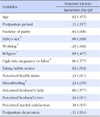Abstract
Purpose
This study aimed to examine the factors associated with postpartum depression and its influence on maternal identity of postpartum women.
Methods
Research design was a cross sectional descriptive study with a total of 89 women within the six month postpartum period. Associations of eating habits, overall sleep quality and other factors with postpartum depression utilizing the Korean Beck Depression Inventory (K-BDI) were done. The influence of postpartum depression on maternal identity was analyzed. Variables yielding significant associations (p<.05) were included in an adjusted logistic regression and a stepwise multiple regression.
Results
Mean scores of postpartum depression was 9.42±6.08 and 31.5% (n=28) for mild depression, 11.2% (n=10) was moderate and 4.5% (n=4) was severe depression on the K-BDI scale. Perceived health status and overall sleep quality were predictors of postpartum depression. Postpartum depression and the husband's love were predictors of maternal identity.
Figures and Tables
Summary Statement
▪ What is already known about this topic?
Postpartum depression has been known to have an association with psychosocial factors and maternal identity, particularly within 6 weeks of postpartum period.
▪ What this paper adds?
Womens' subjective evaluation for health status and overall sleep quality were influencing factors for postpartum depression, with husband's love and postpartum depression being influencing factors on maternal identity.
▪ Implications for practice, education and/or policy
Postpartum depression management could be helpful to enhance maternal identity of women experiencing depression. Womens'subjective evaluation of their health perception of overall sleep quality would be indicators for early detect postpartum depression.
References
1. Centers for Disease Control and Prevention. Prevalence of selfreported postpartum depressive symptoms-17 states, 2004-2005. MMWR Morb Mortal Wkly Rep. 2008; 57(14):361–366.
2. Lee SO, Yeo JH, Ahn SH, Lee HS, Yang HJ, Han MJ. Postpartum depressive score and related factors pre- and post-delivery. Korean J Women Health Nurs. 2010; 16(1):29–36.

3. Song JE. Influencing factors of postpartum depression between 4 to 6 weeks after childbirth in the postpartum women. Korean J Women Health Nurs. 2009; 15(3):216–223.

4. Youn JH, Jeong IS. Predictors of postpartum depression: Prospective cohort study. J Korean Acad Nurs. 2013; 43(2):225–235.

5. Yeo JH. Postpartum depression and its predictors at six months postpartum. Korean J Women Health Nurs. 2006; 12(4):355–362.

7. Park YJ, Shin HJ, Ryu HS, Cheon SH, Moon SH. The predictors of postpartum depression. J Korean Acad Nurs. 2004; 34(5):722–728.

8. Choi SY, Gu HJ, Ryu EJ. Effects of fatigue and postpartum depression on maternal perceived quality of life (MAPP-QOL) in early postpartum mothers. Korean J Women Health Nurs. 2011; 17(2):118–125.

9. Cho EJ. Subjective sleep quality in depressed and non-depressed mothers during the late postpartum period. Korean J Women Health Nurs. 2009; 15(2):108–120.

10. O'Keane V, Marsh MS. Depression during pregnancy. BMJ. 2007; 334(7601):1003–1005.
11. Bowen A, Muhajarine N. Prevalence of antenatal depression in women enrolled in an outreach program in Canada. J Obstet Gynecol Neonatal Nurs. 2006; 35(4):491–498.

12. Leigh B, Milgrom J. Risk factors for antenatal depression, postnatal depression, and parenting stress. BMC Psychiatry. 2008; 8:24.

13. Barr JA. Postpartum depression, delayed maternal adaptation, and mechanical infant caring: A phenomenological hermeneutic study. Int J Nurs Stud. 2008; 45(3):362–369.

14. Logsdon MC, Wisner KL, Pinto-Foltz MD. The impact of postpartum depression on mothering. J Obstet Gynecol Neonatal Nurs. 2006; 35(5):652–658.

15. Kwon MK, Kim HW, Kim NS, Jang JA. Postpartum depression and maternal role confidence, parenting stress, and infant temperament in mothers of young infants. J Korean Acad Child Health Nurs. 2006; 12(3):314–321.
16. Kim JI. A validation study on the translated Korean version of the Edinbergh postnatal depression scale. Korean J Women Health Nurs. 2006; 12(3):204–209.

17. Kim JI. Related factors to postpartum care performance in postpartum women. Korean J Women Health Nurs. 2007; 13(2):98–104.

18. Kim HW, Jung YY. Influencing factors on antenatal depression. Korean J Women Health Nurs. 2010; 16(2):95–104.

19. Faul F, Erdfelder E, Lang AG, Buchner A. G*Power 3: A flexible statistical power analysis program for the social, behavioral, and biomedical sciences. Behav Res Methods. 2007; 39(2):175–191.
20. Lee YH. The relations between attribution style, life events, event attribution, hopeless and depression. Seoul: Seoul National University;1993. [dissertation].
21. Kwon MK. Antenatal depression and mother-fetal interaction. J Korean Acad Child Health Nurs. 2007; 13(4):416–426.
22. Kim HW, Hong KJ. Development of a maternal identity scale for pregnant women. J Nurs Acad Soc. 1996; 26(3):531–543.

23. Kim HW. Associations of dietary intake levels with ante-natal depression. Korean J Women Health Nurs. 2011; 17(3):256–264.
24. Kim HW, Jung YY. Effects of antenatal depression and antenatal characteristics of pregnant women on birth outcomes: A prospective cohort study. J Korean Acad Nurs. 2012; 42(4):477–485.

25. Sung TL. Understandable statistical analysis using SPSS/AMOS: From descriptive statistics to structural equation model. Seoul: Hakjisa;2007.
26. Field T. Postpartum depression effects on early interactions, parenting, and safety practices: A review. Infant Behav Dev. 2010; 33(1):1–6.

27. Buysse DJ, Reynold CF III, Monk TH, Berman SR, Kupfer DJ. The Pittsburgh Sleep Quality Index: A new instrument for psychiatric practice and research. Psychiatry Res. 1989; 28(2):193–213.

28. Leung BM, Kaplan BJ. Perinatal depression: Prevalence, risks, and the nutrition link-a review of the literature. J Am Diet Assoc. 2009; 109(9):1566–1575.

29. Kim HW, Hwang MS, Hong KJ. Primipara's maternal identity and self confidence for caring the baby during the immediate postpartum period. J Korean Acad Womens Health Nurs. 1998; 4(1):65–77.




 PDF
PDF ePub
ePub Citation
Citation Print
Print






 XML Download
XML Download